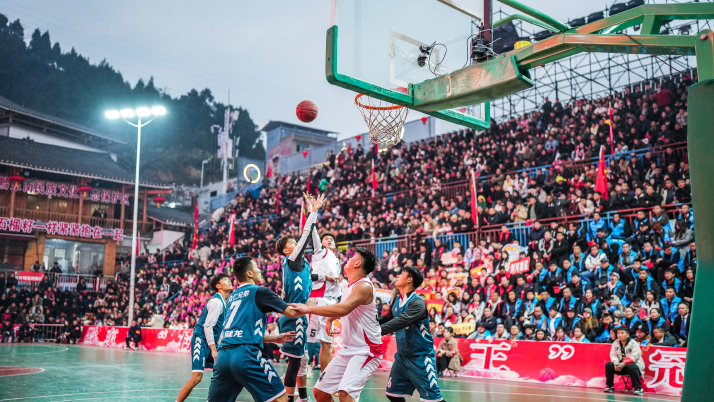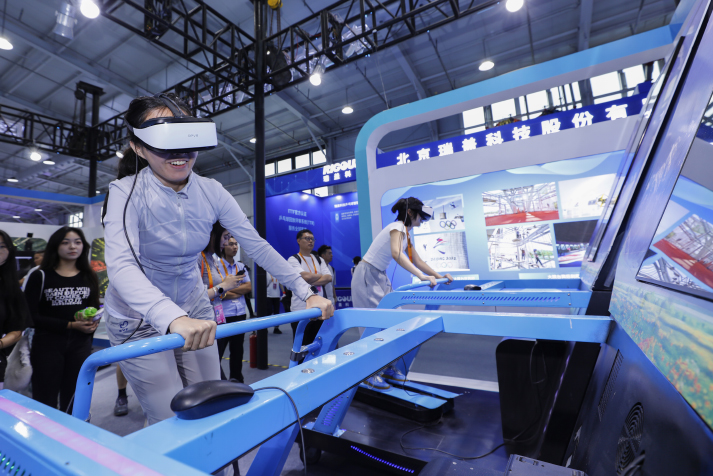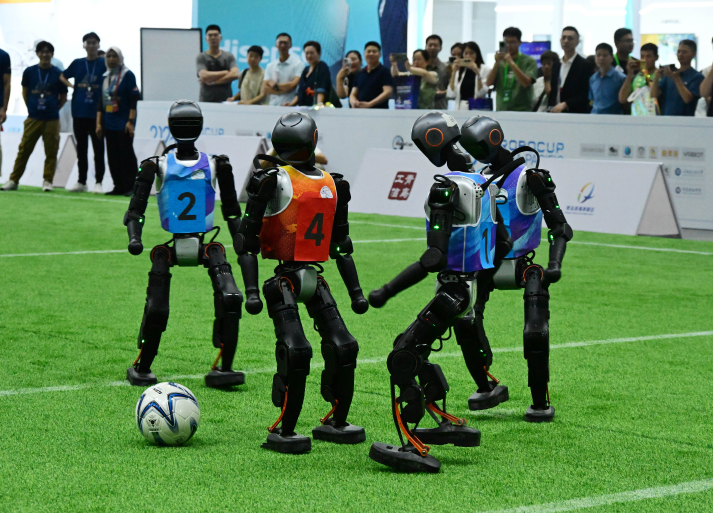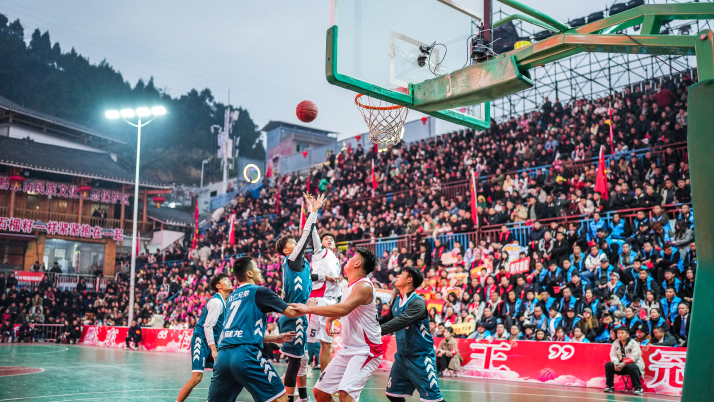
Players compete in the final match of the Village Basketball Association Championship Tournament, held in Taipan Village, Qiandongnan Miao and Dong Autonomous Prefecture of Guizhou Province, on January 2 (XINHUA)
For die-hard sports fans, watching sports goes far beyond living rooms, neighborhood fields and local stadiums. They book weekend getaways, traveling for up to thousands of kilometers to immerse themselves not only in matches but also in new cuisines and cultures.
The love of sports also inspires many to purchase team merchandise, and invest in personal training and high-quality sporting and fitness equipment. Meanwhile, cities around China are also realizing that a thrilling game worth traveling for is one of the most effective means to boost consumption and promote culture.
“I’m not a die-hard soccer fan, but I plan to watch a Jiangsu Football City League (Suchao) match in late September,” Song Yi, a 41-year-old Beijing resident, told Beijing Review. The soccer league of Jiangsu Province in east China, the Suchao has become a national sensation in 2025, with its fierce intercity rivalries based as much on cultural pride as on pride in soccer prowess.
“Since our match tickets come with discount coupons for major attractions in Yixing, Suqian and Wuxi (in Jiangsu), I’ll take my family to explore these cities. We’ll also try some outdoor sports activities there. I’m really looking forward to experiencing the live match atmosphere,” Song said. “What sets a sports-themed vacation apart from a pure sightseeing trip is how it helps instill health and fitness awareness in our child.”
As a provincial amateur soccer league that has captured a nationwide following for its community spirit and passionate local support, the Suchao is a prominent example of the growing power of China’s grassroots sports culture.
“China’s sports industry is accelerating into a new phase of high-quality development, playing a key role in stimulating consumption and expanding domestic demand,” Sun Jin, a professor at the School of International Trade and Economics at the University of International Business and Economics, told China Central Television (CCTV). “Take sporting events like the Village Super League and the Suchao as examples, while ticket prices remain low, the events effectively drive derivative consumption across such areas as transport, accommodation, dining and experiential tourism, unleashing regional economic potential.”
Supportive policies
Looking forward, the sports industry and related economy will continue to be driven by increasing market demand as well as a number of supportive policies. The General Office of the State Council recently released guidelines on unleashing sports consumption potential and further promoting the high-quality development of the sports industry, setting the goal of nurturing more world-leading sports enterprises and events by 2030. The document aims to support the development of the sports industry, elevating its total scale to over 7 trillion yuan ($980 billion).
The guidelines have been introduced in response to the rapid growth of China’s sports sector and rising public awareness of health.
According to official data, the sports industry has maintained an average annual growth rate of over 10 percent in the past five years. In the first half of 2025, combined sports goods sales on four major e-commerce platforms, namely JD.com, Taobao, Tmall and Douyin, reached more than 218.16 billion yuan ($30.56 billion), up 17.5 percent year on year, outpacing the 6-percentage-point growth in online retail sales of physical goods nationwide during the same period.
During this year’s annual legislative session in March, China unveiled a new health campaign: the national year of weight management, aimed at combating obesity and sedentary lifestyles. Critically, the campaign is closely linked to national fitness goals. By promoting physical activity as a core component of healthy weight management, in addition to a balanced diet, the government seeks to channel public attention toward regular exercise. Sporting facilities, schools and community organizations are being encouraged to offer more accessible programs, such as weekend youth leagues and city running events.
“Promoting healthy lifestyles and integrating sports into daily life are essential for weight management. The development of the sports industry is not only a driver of economic growth but also a vital part of our people-centered development philosophy. In addition to upgrading sports consumption and providing people with more choices, we must also supply more public sports facilities and resources,” Lei Haichao, head of the National Health Commission, said at a press conference on people’s living standards on March 9.

Visitors try virtual skating at the China International Fair for Trade in Services in Beijing on September 10 (XINHUA)
Further integration
The State Council guidelines on unleashing sports consumption potential proposes that enriching sporting products and services from the supply side is pivotal. By diversifying sporting events and optimizing event service management, it aims to meet the needs of more diverse groups.
Amid the Chinese Government’s strong support for the sports industry in recent years, including but not limited to the Healthy China initiative and the national weight management campaign, the country has not only become a host for many internationally renowned sporting events but also seen many regions developing athletic competitions that reflect local culture and characteristics, tailored to their specific audiences.
In terms of international events, Beijing has made history as the first city to host both the Summer Olympics in 2008 and Winter Olympics in 2022. Following the Olympic Winter Games, winter sports gained continuous widespread popularity across China. Beyond Beijing and its neighboring co-host city Zhangjiakou, regions such as Xinjiang Uygur Autonomous Region and the three provinces in northeast China, namely, Heilongjiang, Jilin and Liaoning, have also leveraged their geographical advantages and emerged as prominent destinations for winter sports tourism. Capitalizing on the experience it gained by hosting the Winter Olympics, Beijing also organized the figure skating qualifier event on September 19-21 this year for the Milan 2026 Winter Olympics.
Chengdu in southwest China has also established itself as a repeat host of internationally renowned sporting events. The 2025 Chengdu World Games took place from August 7 to 17. Building on the success of the 2023 World University Games, the city is leveraging its world-class venues and operational expertise to promote the development of emerging and non-Olympic sports such as frisbee, dance and climbing. This effort has accelerated the modernization of local sports infrastructure, with public facilities like the Dong’an Lake Sports Park becoming popular venues for daily exercise among residents.
In addition to major international events, hosting domestic sporting competitions has played a significant role in enhancing Chengdu’s image and boosting regional economic development, further demonstrating the growing role of sports in promoting culture and tourism. With the explosive popularity of events like the Village Super League and Village Basketball Association in Guizhou Province, “traveling to Guizhou for games” has become a new tourism trend.
The Village Super League, a grassroots soccer tournament initiated by local residents in Rongjiang County in Guizhou, has gained nationwide attention for its passionate community participation and lively cultural atmosphere created by the ethnic minority peoples who live there.
Guizhou has hosted some sporting events at scenic spots such as Huangguoshu Waterfall, Libo, Wanfenglin (Forest of Ten Thousand Peaks) and Mount Fanjing, generating hefty revenue.
“Sports contribute greatly to our tourism development, bringing visitor flow, enriching business models, and enhancing service quality. It’s fair to say that a deeply integrated culture-sports-tourism atmosphere has already taken shape across the province,” Kuang Zhengzhi, Director of the Guizhou Sports Economic Development Center, told Xinhua News Agency.
“The phenomenal success of the Village Super League demonstrates the massive public demand for high-quality, emotionally resonant grassroots sports content,” Zhang Qing, founder and CEO of Key-Solution Sports Consulting, told news portal Yicai. “It achieves value not through massive capital investment or star players, but by tapping into local culture and inspiring community participation. This model holds implications for the diversified development of China’s sports industry. It promotes a sporting philosophy of ‘everyone can participate, everyone can enjoy,’ which represents a major trend for the future of the sports industry.”
Giving discounts to local attractions is part of local government efforts to integrate sports with cultural tourism. Many visitors, like Song, who buy tickets to local sporting events such as the Suchao, receive discounts on local attractions or hotels provided by the host regions.
For instance, during the Suchao matches in Taizhou this June, ticketed spectators were offered free admission to 48 local tourist sites in the city and complimentary tastings of traditional Taizhou breakfast, along with discounts on parking, accommodation and shopping.
“These incentives certainly extended my stay,” Song added. “We originally planned to leave right after the match, but staying a couple of extra days was very cost-effective. It was also a great opportunity to further experience the local culture post-game.”

Robots compete during a soccer game at the 2025 Robot World Cup (RoboCup) Asia-Pacific Qingdao Invitational Tournament in Qingdao, Shandong Province, on September 8 (XINHUA)
Upgrading devices
In addition to diverse sporting events and consumption scenarios, the development of the sports industry has also benefited from the upgrading of sporting goods, including improvements in product quality and technological content. The 2025 China International Fair for Trade in Services was held from September 10 to 14 at Shougang Park in Beijing. In the sports services exhibition area, several cutting-edge products demonstrated a deep integration of technology into sporting equipment.
The Table Tennis Review (TTR) System designed by Beijing Rigour Technology Co. Ltd. attracted numerous fans with its elevated experience. Utilizing high-precision ball detection and tracking algorithms, the system is capable of analyzing the trajectory and landing points of a ball. It has already been deployed in major table tennis events such as the World Table Tennis Championship and World Table Tennis to provide TTR video referee services. It can also be used in table tennis training programs, facilitating the development of school table tennis programs and youth clubs.
“As shown on this large screen, we can track the ball’s trajectory, net clearance height, speed, spin rate and the player’s reaction time in real time during matches,” Zhang Weihua, Vice President of Rigour Technology, said at the event on September 10. “Beyond table tennis, our company’s self-developed systems have been applied in soccer, snooker, tennis, volleyball and other sports. Among these, the soccer intelligence system has been adopted in events such as the AFC U20 Asian Cup.”
During the China Sport Show 2025 held in Nanchang, Jiangxi Province, from May 22 to 25, a wide range of internationally popular sporting equipment was exhibited. Impulse (QingDao) Health Tech Co. Ltd. demonstrated the scientific guidance feature of one of its treadmills: the ability to generate personalized workout plans based on users’ fitness goals and physical test data, covering warm-up, training, stretching and other phases.
The implementation of these functions is made possible by Impulse’s AI-powered scientific health platform. “The AI-based scientific health platform we developed integrates AI and big data technologies to accurately meet the needs of both professional training and the general public, offering diversified solutions for many exercise scenarios,” Liu Hongtao, Chairman and President of Impulse, said at the event. “Once users begin their training, the system collects real-time fitness data, metabolic metrics and physical feedback, dynamically evaluating and adjusting the plan to ensure it aligns with the user’s actual needs.”
“We aim to provide more amateur sports enthusiasts with high-level, professional and customized fitness services.” Liu added.
“The State Council guidelines explicitly call for promoting the upgrading of sporting goods and nurturing a group of globally influential sports enterprises and events, with a key emphasis on the leading role of digitalization and technological innovation. For enterprises, it is essential to seize the trends of digitalization, green transformation and globalization; deepen their expertise in niche sectors; and explore new development paths through innovation,” Luo Jie, Vice Chairman and Secretary General of the China Sporting Goods Federation, said at the launch of the Shenzhen Sci-Tech Sports Industry Fund on September 14.
The fund was established in response to the State Council’s supportive document for the sports industry, an official from the Culture, Radio, Television, Tourism and Sports Bureau of Shenzhen said at the event’s press conference.
“The sporting goods manufacturing industry boasts great potential for growth. Innovative advancements such as smart fitness equipment and digital sporting solutions are reshaping the competitive landscape of the sector. In addition to transitioning from traditional manufacturing to smart manufacturing and expanding from standalone product offerings to comprehensive full-scenario solutions, the industry is also poised to deepen its integration with modern service sectors in the future,” Luo added.
Copyedited by G.P. Wilson
Comments to zhangyage@cicgamericas.com

